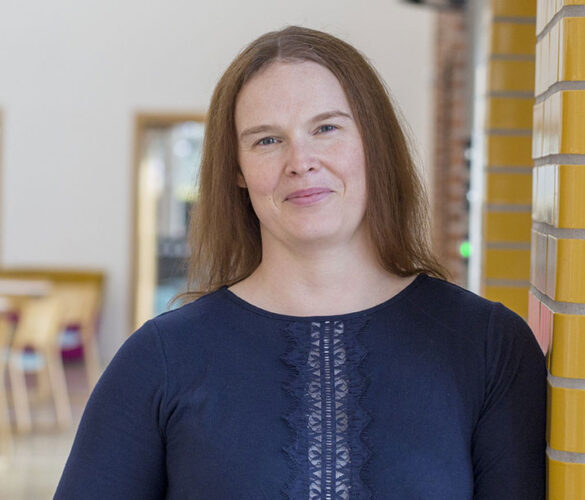NTU Research Success Stories

MTIF Fellow and Microbiology Lead, Dr Samantha McLean is chosen to feature in NTU’s ‘Research Success Stories’.
Medical Technologies Innovation Facility is proud to share that Dr. Samantha McLean, is featured in Nottingham Trent University’s ‘Research Success Stories’ series. Samantha undertakes a dual role as Director of the Blue Zone Consortium at Nottingham Trent University and Microbiology Lead at MTIF. In her interview, Samantha discusses her career trajectory, her vital role at MTIF, and her leadership in the Blue Zone Consortium. She also provides key insights into winning research grants and advice for fellow researchers.
Read Samantha’s Full Interview Below:
In this month’s discussion, we talk to Dr Samantha McLean, Associate Professor of Infection Prevention and Control in the School of Science and Technology. We explore Samantha’s career journey, her role at NTU and her work with the Medical Technologies Innovation Facility (MTIF) and the Blue Zone Consortium. Samantha also shares valuable insights on research funding, emphasising the importance of peer review and cultivating a strong research network. We hope you enjoy reading Samantha’s story.
Can you give us a brief overview of your career to date and your main research interests?
I obtained my PhD from the University of Sheffield in 2007 and then worked for nine years as a post-doctoral researcher investigating how bacteria interact with small molecules and later how they can be engineered to produce high value chemicals. In 2016, I became a Lecturer in Microbiology at Nottingham Trent University, advancing to Senior Lecturer in 2017 and Associate Professor of Infection Prevention and Control in 2024. My research focuses on leading transdisciplinary projects in healthy ageing and infection prevention, addressing global challenges and bridging the gap between cellular-level science and societal impact, contributing to healthier ageing and infection control solutions.
You are the lead academic for MTIF Microbiology, can you explain a bit about MTIF and what your role involves?
MTIF bridges academia and industry to accelerate innovation from bench to bedside, aligning with my interest in transdisciplinary research. Over the past two years, I’ve worked with MTIF to establish microbiology as one of its strategic priorities. This included securing HEIF Commercial Development Funding to hire a commercial microbiologist and winning an SST-MTIF Research Fellowship. Together this enabled our team to support commercial projects and advance research in collaboration with NTU academic schools and industry partners. The fusion of academic and commercial focus has driven impactful projects, translating bioscience into real-world applications.

How can colleagues engage with MTIF?
To engage with MTIF, the best route is to speak to some of the dedicated staff that work in the facility. For research this could be one of the Senior Research Fellows employed by MTIF to strengthen commercial research capabilities: Dr Elena Hunter and Dr Adam Varney. If colleagues are looking to complete commercial work for an industry partner via MTIF then contacting the Commercial Director Michael Ward would be a great place to begin.
You are also the Director of the Blue Zone Consortium, can you tell us more about what the Blue Zone Consortium is and what your role involves?
By 2040, nearly one in seven people in the UK will be over 75, many with multiple chronic conditions. In contrast, blue zones are regions with lower rates of chronic disease, where people live longer, healthier lives. The BBSRC-funded Blue Zone Consortium brings researchers together across disciplines and sectors to develop solutions that translate cutting-edge bioscience into blue zone outcomes. As Director of the consortium, I lead efforts to break down barriers to interdisciplinary research and innovation by providing networking, funding, and professional development opportunities.
How can colleagues engage with the Blue Zone Consortium?
Joining the consortium is easy, click the “Join Us” button on our website and complete the MS Form. Membership is open anyone working in areas related to healthy ageing across any sector and at any career stage.
You’ve made impressive progress in your research career so far and I think some of your insights will be highly beneficial to others. Can we now shift the conversation to external funding? Let’s start by going back to when you secured your first grant. What was the award for, and how did you feel when you found out you were successful?
My first externally funded research grant was awarded by the National Biofilm Innovation Centre. It was a proof of concept grant in collaboration with a company who were interested in developing antimicrobial medical device tubing. Finding out the project had been awarded was very exciting and a proud moment in my career. It gave me a lot of confidence, but I also realised that this was where the hard work would really begin.
Are there any resources or sources of support that you find especially useful during the grant application process that you’d be willing to share?
I ask for feedback on the different sections of my grant applications from experts in those areas. While it can feel daunting to share a draft, I’ve found that my strongest applications were the ones where I received significant feedback prior to submission. The Research Development Team has been especially helpful, offering valuable knowledge and connections across the university. I highly recommend engaging with them early in the process for their insight and support.
What key insights or lessons have you gained from your experience with the grant application process?
Having the right mindset is crucial for grant applications, as rejection is inevitable. Resilience and persistence are key. I view unsuccessful applications as learning opportunities, using feedback to improve and refine future submissions. Developing a strong research network is also essential. I’ve been fortunate to collaborate with many fantastic colleagues who’ve offered advice, served as co-investigators, invited me to co-apply on their grants, and acted as mentors. This collaborative support has been instrumental in driving my research success, allowing me to grow and strengthen my work through shared expertise and insights.
Lastly, what advice would you offer to researchers who are thinking about applying for external funding but might feel uncertain or hesitant about the process?
I’ve struggled with imposter syndrome, so I understand the uncertainty and hesitation around applying for grants. However, success only comes from taking the leap, and this is where resilience and persistence become essential. Professional development has been invaluable in helping me build a “toolkit” to reframe my mindset and advance my research career. Programmes like Leading at NTU, Aurora, and the UIIN Impactful Researcher Program have made a significant difference. I encourage anyone as part of their research journey to invest in professional development—it lays a strong foundation for long-term success and helps overcome self-doubt.
Thank you for your wonderful insights Samantha!